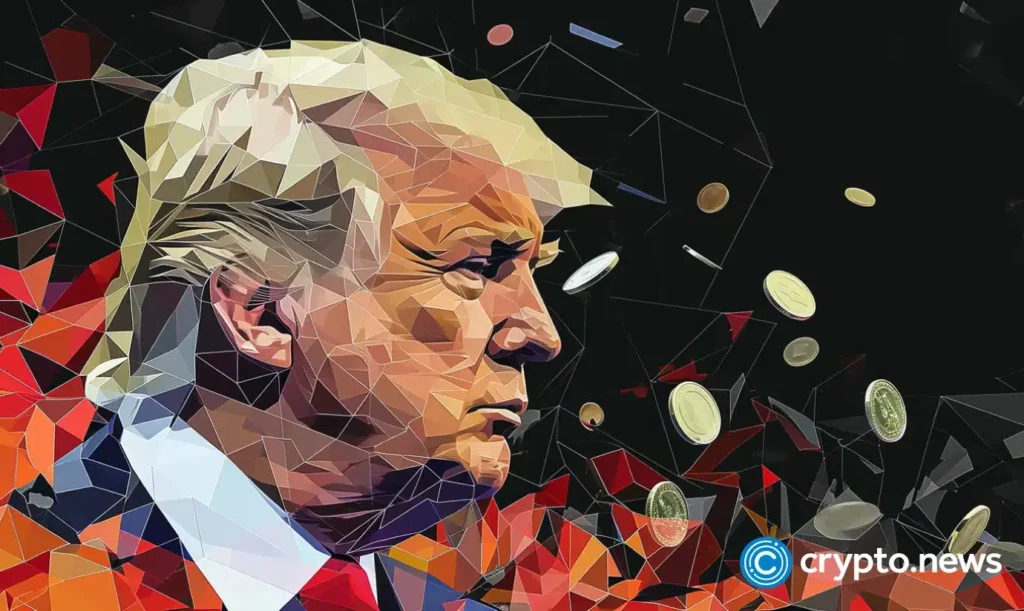The Trump family’s latest venture – initially billed as a DeFi platform dubbed “The Defiant Ones,” but since rebranded as World Liberty Financial – is rife with controversy just days after its unveiling.
While Trump’s eldest sons, Eric Trump and Donald Trump Jr., are “ambassadors” for World Liberty Financial, CoinDesk reports that the former “Defiant” firm is also tied to individuals involved in the liquidity protocol Dough Finance.
Recall how Dough Finance lost $1.8 million in Ethereum (ETH) and USD Coin (USDC) due to a flash loan attack on July 12.
Zachary Folkman and Chase Herro, the duo who founded Dough Finance, are also at the helm of the new Trump-led company. They founded Date Hotter Girls LLC and cryptocurrency-focused Pacer Capital, respectively.
Trump first endorsed the decentralized finance project in an August 22 post on Truth Social. He spoke about it again on August 29 (it was then called World LibertyFi).
The X accounts of two of his family members were then compromised and used to promote a fake Solana-based memecoin. One of the targets was Lara Trump, co-chair of the Republican National Committee.
The whole move seems fishy to Nic Carter, a cryptocurrency venture capitalist and Trump supporter who has been blunt on the matter. “It’s a huge mistake,” he told Politico. “It seems like Trump’s inner circle is just capitalizing on his recent enthusiasm for crypto in a somewhat naive way, and frankly, it seems like they’re burning a lot of the goodwill that’s been built with the industry so far.”
“Goodwill?” It’s worth noting that some of the most famous names in the industry have been convicted of fraud.
Former Binance CEO Changpeng Zhao was sentenced to four months in prison; cryptocurrency entrepreneur Do Kwon spent more than six months in a Montenegrin prison; and FTX founder Sam Bankman-Fried was sentenced to 25 years in prison.
Trump is also not the first to have his businesses tainted by illegalities (see the Donald J. Trump Foundation and Trump University). He is also the first former US president to be convicted of serious crimes.
Trump, Crypto and Trust
Trump, who once said he was “not a fan” of Bitcoin (BTC), has incorporated pro-crypto policies into his campaign speeches ahead of the 2024 presidential election.
In May, he became the first major political candidate to accept cryptocurrency donations. Cryptocurrency advocates then received a flurry of promises if Trump were reelected: a government-backed cryptocurrency reserve and the firing of Gary Gensler, the oft-criticized current chairman of the Securities and Exchange Commission.
His U-turn earned him the support and financial backing of people as wealthy as Cameron and Tyler Winklevoss – founders of the Gemini exchange – who each donated $1 million in Bitcoin to the former president.
But since then, fraudsters have targeted his so-called “MAGA” base with fake cryptocurrency sites and deceptive donation centers. In June, a London-based cybersecurity firm, Netcraft, began monitoring several attacks surrounding the Trump campaign, uncovering fraudulent donation schemes and phishing attempts.
The latest scrutiny surrounding World LibertyFi and its World Liberty Coin is no different.
For weeks, the Trump brothers have been talking about a financial initiative that would challenge the traditional banking system. And when that initiative was launched, the scammers had plenty to work with.
Carter, who remains a Trump supporter (because “Trump himself is only marginally involved”), warns that the World Liberty project “is really hurting” the Republican candidate’s electoral prospects. Polls indicate that the presidential race against Democratic Vice President Kamala Harris is extremely close.
“This will be the juiciest target in DeFi and it comes from a protocol that itself was hacked. (It’s) also an obvious target for the SEC,” he wrote on September 3. “At best it’s an unnecessary distraction, at worst it’s a huge embarrassment and a source of (additional) legal problems,”




